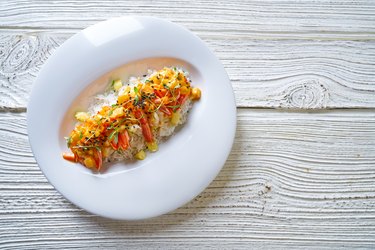
Though prawns, or shrimp as they're commonly known in the United States, are a high-cholesterol food, they're otherwise nutritious and not necessarily off-limits on a cholesterol-conscious diet. If you're following a cholesterol-lowering diet per your doctor's recommendation, talk to him about which foods are the smartest choices for your individual situation.
Importance of Cholesterol
Video of the Day
Shrimp are including in the category of high cholesterol foods. Some cholesterol is needed in the body for hormone production and digestion. However, the body makes enough cholesterol to support these functions. Adding high cholesterol foods to your diet increases risk of health issues.
Video of the Day
The amount of cholesterol in your blood plays a role in heart health since high levels are a major risk for coronary heart disease, heart attack and stroke. LDL, in particular, is a bad form of cholesterol that can build up on the inside of your artery walls. It can combine with other substances and create thick, hard deposits known as plaque. This is dangerous because over time, plaque can cause your arteries to stiffen and become narrow, setting the stage for blockage.
Nutrition of Shrimp
In general, crustaceans — including shrimp — are low in calories and fat. According to the United States Department of Agriculture, Agricultural Research Service 3.5-ounce serving contains 99 calories, 24 grams of protein and 0.3 gram of total fat. Of the fat content about .06 gram comes from saturated fat. Shrimp are a good source of protein, which is vital for skin and nail health, as well as building muscle. Protein also helps form antibodies which fight infections.
When it comes to cholesterol, shrimp is known for its rich content. A 3.5-ounce cooked serving contains 189 milligrams. In comparison, the same size serving of salmon contains about 62 milligrams of cholesterol.
Cholesterol-Lowering Recommendations
While dietary cholesterol may influence LDL levels, its effect on cholesterol is much milder than the effect of saturated fat and trans fat, according to NYU Langone Medical Center. Most cholesterol-lowering diets focus on reducing your saturated fat intake for this reason. Limit saturated fat to less than 10 percent of your daily intake if your goal is to lower cholesterol, recommends NYU Langone Medical Center. Aim to limit your cholesterol intake to no more than 200 milligrams per day on a cholesterol-lowering diet.
The Final Verdict
Shellfish cooked without butter is allowed on a low-cholesterol, low-fat diet, according to the University of Massachusetts Medical School. This doesn't mean you have the green light to overindulge. It means that moderate intake of shrimp is unlikely to have an adverse effect on your cholesterol levels. It's crucial to adopt a nutritious, balanced diet in order to get your cholesterol levels within a healthy range. A desired range for total cholesterol is less than 200 milligrams per deciliter, less than 100 grams per deciliter for LDL and above 60 grams per deciliter for HDL, which is the good form of cholesterol.
- American Heart Association: Why Cholesterol Matters
- USDA National Nutrient Database: Crustaceans, Shrimp, Untreated, Cooked
- USDA National Nutrient Database: Fish, Salmon, Coho, Farmed, Cooked, Dry Heat
- NYU Langone Medical Center: Cholesterol-Lowering Diet
- University of Massachusetts Medical School: Expert’s Corner: Impact of Dietary Cholesterol ‘Overrated’